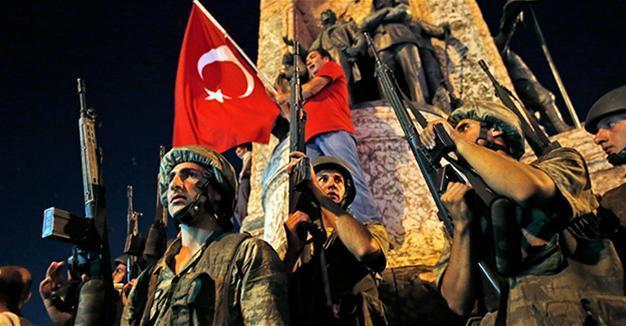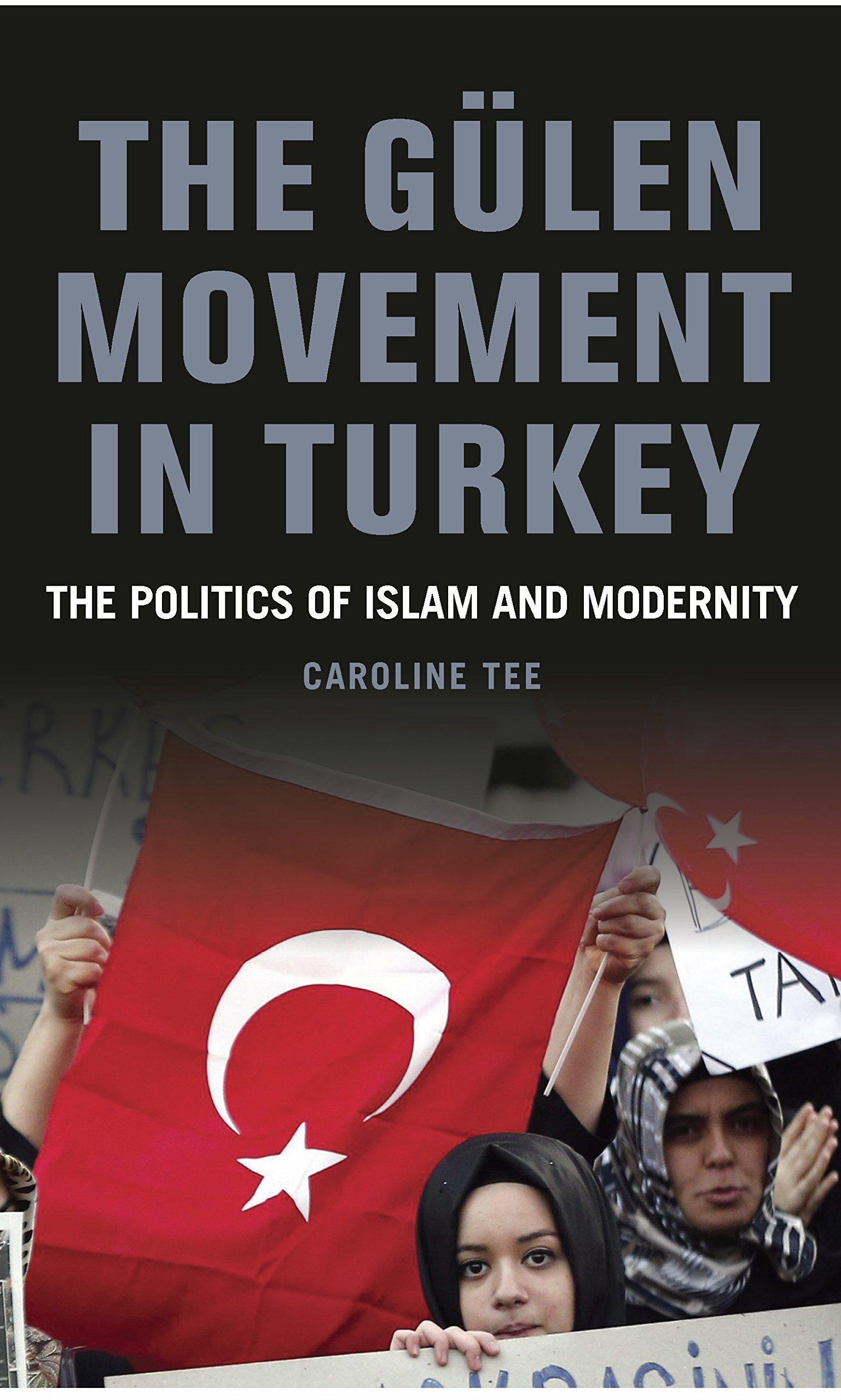The Gulen movement past and present
William Armstrong - william.armstrong@hdn.com.tr

Anti-coup protesters chant behind soldiers on the night of the attempted military coup in Istanbul's Taksim Square on July 16, 2016. AP photo
‘The Gulen Movement in Turkey: The Politics of Islam and Modernity’ by Caroline Tee (IB Tauris, $20, 227 pages)The damage caused by the Gülen movement to institutions and trust in Turkey is enormous. It’s easy to forget amid the fog of the government’s merciless post-coup attempt crackdown, but the opposition should be just as angry with the Gülenists as it is with the government for the deteriorating situation in the country.
A deep exploration of how the network of Pennsylvania-based Islamic preacher Fethullah Gülen infiltrated, manipulated, and undermined state institutions over decades has yet to be published in English. Some useful articles scratching the surface have appeared, but most books on the subject (not including puff pieces) are written by sociologists and anthropologists, examining the Gülen movement from a religious or social angle.
 “The Gülen Movement in Turkey” by University of Bristol academic Caroline Tee is another anthropological study. It is a scholarly and critical examination of how the Gülen movement expanded from its modest origins in the late 1960s to a multi-billion dollar international religious-business network. Tee particularly explores how the Gülenists have combined pious religious motivation with scientific endeavor. Published after Turkey’s July 15 coup attempt, masterminded by a core of Gülen-aligned soldiers, the book’s timing is apposite even if it does not focus on today’s most pertinent aspects of the Gülenists’ domestic operations.
“The Gülen Movement in Turkey” by University of Bristol academic Caroline Tee is another anthropological study. It is a scholarly and critical examination of how the Gülen movement expanded from its modest origins in the late 1960s to a multi-billion dollar international religious-business network. Tee particularly explores how the Gülenists have combined pious religious motivation with scientific endeavor. Published after Turkey’s July 15 coup attempt, masterminded by a core of Gülen-aligned soldiers, the book’s timing is apposite even if it does not focus on today’s most pertinent aspects of the Gülenists’ domestic operations.Gülen first started attracting devotees as a charismatic preacher in the western city of İzmir in the late 1960s. His followers were attracted by his message apparently combining spiritual commitment with worldly success. Taking inspiration from Said Nursi’s ideology of “müspet hareket” (positive action), Gülen came up with a framework to reconcile Islam and modernity that allowed his pious Muslim followers a space to survive and prosper. “He set out to show his early audience of students, small-business owners and tradespeople how religious piety might complement, rather than compromise, their professional activities,” Tee writes.
Gülen’s followers flourished in the years after Turkey’s 1980 coup, when the post-coup regime’s conservative nationalist “Turkish-Islamic synthesis” opened up space for religious groups. Gülen-linked private schools proliferated and Gülenists branched out into the media sector in the 1990s. After the fall of the Soviet Union, the Gülen movement particularly expanded in the newly independent Central Asian states through educational initiatives.
In Turkey, private schools run by Gülen sympathizers were vital in extending economic and political influence. From modest beginnings, this network expanded to offer students quality education in preparation for the ubiquitous examinations that young Turks have to navigate. Despite the religious motivation of many teachers and administrators, Gülen-linked schools were overwhelmingly focused on practical, scientific education. That emphasis was central to their brand appeal and success, opening up a strategic sphere of influence for the Gülen movement.
The Gülen schools offered an educational experience unique within the Turkish market, “spanning the gulf between religious and secular systems that are otherwise sharply polarized,” Tee writes. “The ability of Gülenist educators to teach modern science apparently so successfully, while retaining at the same time a strong Islamic religious identity, sets them apart from their competitors.” Gülenists also benefited from the rapid expansion of the Turkish higher education sector, with around 10 universities linked to Gülen opening since Fatih University first welcomed students in Istanbul in 1996. The government has closed down or taken over all of these universities and schools since the July coup attempt.
In an earlier book, sociologist Joshua Hendrick referred to “strategic ambiguity” as the Gülen movement’s modus operandi. That ambiguity takes on a more sinister aspect considering what we now know about Gülenist misdeeds. Members illegally leaked central exam questions to other Gülenists to infiltrate them into top state positions. When there, many played leading roles in the fabricated Balyoz coup plot and Ergenekon cases, as well as the Kurdistan Communities Union (KCK) crackdown. It is absurd for the Turkish government and prosecutors to give it a made-up name like the “Fethullahist Terror Organization (FETÖ),” but a system of hierarchical leadership permeates the network. Tee writes that there is a “pyramid-like structure of authority that encompasses the entire movement and leads ultimately back to Pennsylvania, to the inner core of disciples and to Gülen himself.”
Gülen moved to the U.S. in 1999 after Turkey’s “post-modern” coup in 1997. Today he lives, hermit-like, on a ranch in Pennsylvania, health increasingly shaky at the age of 75. Gülenists oversee a network of hundreds of charter schools across the U.S. that has come under increased federal scrutiny. Their influence in the U.S. is predicated on what Tee describes as one of the Gülen movement’s core strengths: “Its ability to understand given social and cultural demographics, and to adapt itself accordingly.” It is not hard to see why Gülen’s message – purporting to reconcile Islamic piety with secularism and civic democracy, modern education and intercultural dialogue - resonated in the West looking for a “moderate Islam” after 9/11. Its ecumenical veneer shielded the group from the widespread reports of dirty tricks carried out by Gülenists back in Turkey.
In Turkey too, the Gülen movement’s message tapped into a specific social and political vacuum between traditional religious and secular approaches. After the recent coup attempt and subsequent crackdown, it now looks like their days are numbered in Turkey. But the damage they have done to the country’s social and political fabric, hand in hand with the current government, will last for many years.
* Follow the Turkey Book Talk podcast via Twitter here, iTunes here, Stitcher here, Podbean here, or Facebook here.










